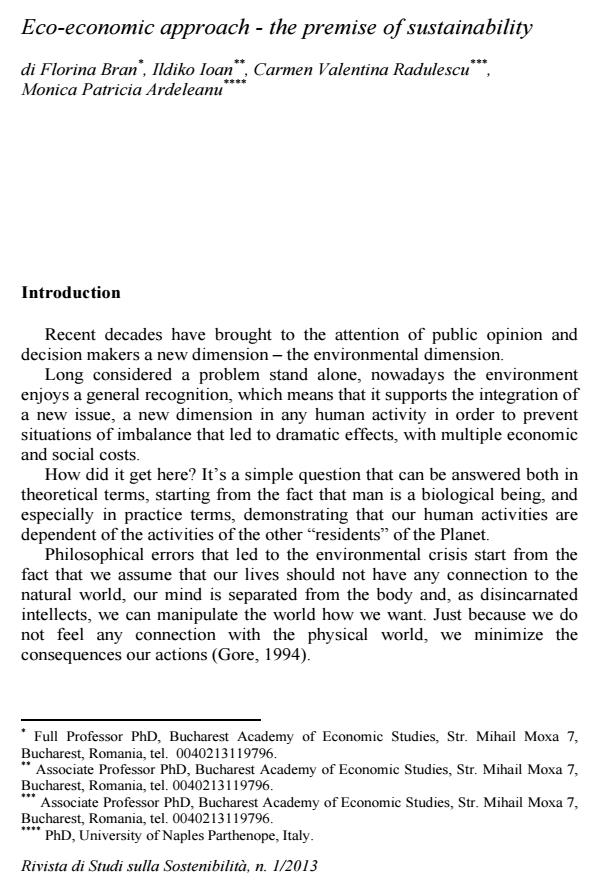Eco-economic approach - the premise of sustainability
Journal title RIVISTA DI STUDI SULLA SOSTENIBILITA'
Author/s Florina Bran, Ildiko Ioan, Carmen Valentina Radulescu, Monica Patricia Ardeleanu
Publishing Year 2013 Issue 2013/1
Language English Pages 8 P. 141-148 File size 196 KB
DOI 10.3280/RISS2013-001011
DOI is like a bar code for intellectual property: to have more infomation
click here
Below, you can see the article first page
If you want to buy this article in PDF format, you can do it, following the instructions to buy download credits

FrancoAngeli is member of Publishers International Linking Association, Inc (PILA), a not-for-profit association which run the CrossRef service enabling links to and from online scholarly content.
Recent decades have brought to the attention of public opinion and decision makers a new dimension - the environmental dimension. For a long while this was considered a stand alone problem, but nowadays the environmental protection enjoys a general recognition, leading to the integration of this new issue in the management of any human activity in order to prevent situations of imbalance that led to dramatic effects, with high economic costs. The aim of the paper is to explain the conceptual framework for the emergence of the eco-economy concept and the implications of integrating ecological restrains in the economic thinking in order to pursue the goal of sustainability. The first section explores the drivers of human behavior from different perspectives, analyzing the implications of biological, intellectual and spiritual interactions. The second section analyzes the clashing timescales that induce lags between the rhythm of nature and the rhythm of human activities. The last section highlights how the eco-economic approach would contribute to the achievement of sustainable development’s goals.
Keywords: Sustainability, interaction, behavior, time-scale, eco-economy.
- Bran F. (2000). Ecologie generala si protectia mediului. Bucuresti: Editura ASE.
- Bran F. (2002). Componenta ecologica a deciziilor de dezvoltare economica (sivicultura si turism). Bucuresti: Editura ASE.
- Bran F. Ioan I., Marin D., Mockesch C. (1999). Mic lexicon de protectia mediului. Bucuresti: Editura Economica.
- Bran F., Simon T., Ioan I. (1999). Geografie economia mondiala. Bucuresti: Editura Economica.
- Bran F., Marin D., Simon T. (1999). Economia turismului si mediul inconjurator. Bucuresti: Editura Economica.
- Bran F., Simon T., Nistoreanu P. (1999). Ecoturism. Bucuresti: Editura Economica.
- Bran F., Ioan I. (2002). Ecosfera si politici ecologice. Bucuresti, Editura ASE.
- Bran P. (2001). Economia valorii. Bucuresti: Editura ASE.
- Ioan I., Bran F., Rădulescu C.V. (2010). Dimensiunea managerială a conservării naturii. Bucuresti: Editura Universitară.
- Brown L. (2000). Starea lumii 2000. Bucuresti: Editura tehnica.
- Brown L. (2001). Eco-economia. Bucuresti: Editura tehnica, DOI: 10.1016/S0921-8009(00)00293-7
- Georgescu-Roegen N. (1996). Legea entropiei si procesul economic. Bucuresti: Editura Expert.
- Gore A. (1994). Pamantul in cumpana. Ecologia si spiritul uman. Bucuresti: Editura Tehnica.
- Hagege C. (1985). L’homme de paroles. Contribution linguistique auxhumaines. Fayard: Librairie Artheme.
- Nietzsche F. (1994). Stiinta voioasa (“la gaya scienza”). Genealogia moralei. Amurgul idolilor. Bucuresti: Editura Humanitas.
Florina Bran, Ildiko Ioan, Carmen Valentina Radulescu, Monica Patricia Ardeleanu, Eco-economic approach - the premise of sustainability in "RIVISTA DI STUDI SULLA SOSTENIBILITA'" 1/2013, pp 141-148, DOI: 10.3280/RISS2013-001011